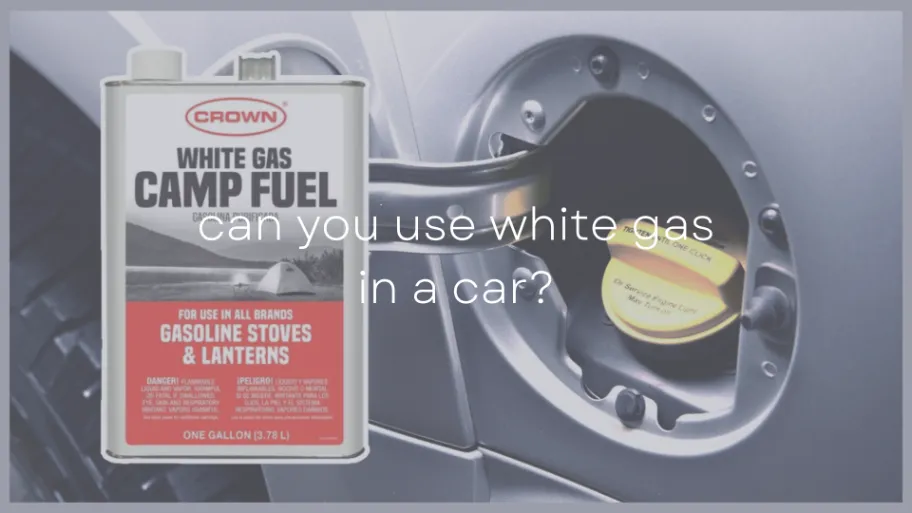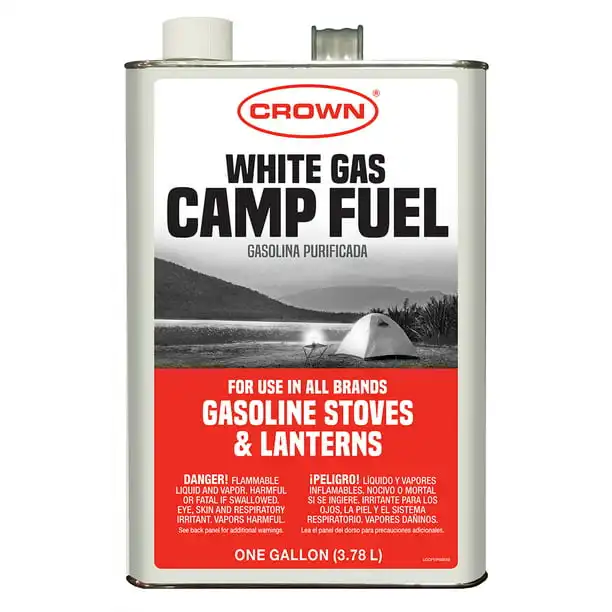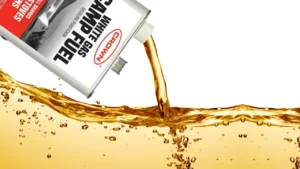I love camping trips in remote places far away from towns and cities but the only downside is that gas stations are few and far between in my favorite places.
I’ve often wondered what would happen if I ran out of gas and if I could use Coleman fuel (or white gas instead). After thoroughly researching the topic, the conclusion is very interesting.
You can use white gas in a car because it’s a pure form of gasoline. However, you should only do it in an emergency and not on a regular basis. White gas doesn’t contain the additives or octanes that gasoline does, which helps lubricate and protect your engine’s parts.
White gas is also much more expensive than gasoline but has a longer shelf life when opened and exposed to air and won’t become sludge-like as fast as gasoline.
Before using white gas in your car, it’s important to understand the risks, the benefits and drawbacks.
NOTE: Follow your manufacturer's guidelines when using alternative fuels in your car and do so at your own risk.
What Happens If You Use White Gas in a Car?
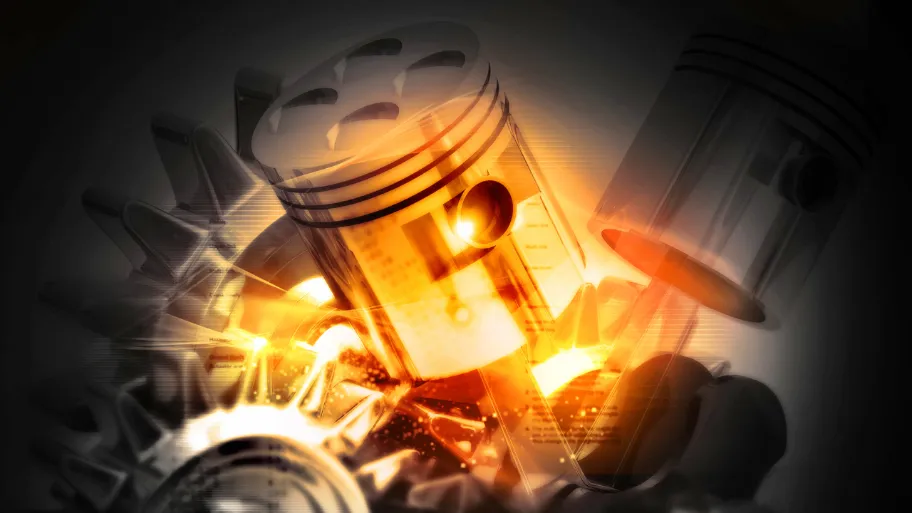
If you use white gas in your car only once or in an emergency, it' shouldn’t's unlikely to cause any damage and your car will likely get you to your destination. However, because it isn’t designed for spark-ignited combustion engines, your car won’t perform optimally.
If you have a little gasoline left, combine it with the white gas if you can so your engine can benefit from the gasoline’s additives and octanes.
I don’t recommend using white gas on an ongoing basis in your car because the lack of additives will cause the components to be unlubricated and to make a knocking noise due to the friction, which may wear them down much faster. As you're likely aware, this can lead to some serious damage that can be extremely expensive to fix.
The YouTube video below shows someone running Coleman fuel/white gas in a gasoline engine. Although white gas doesn’t give optimal engine performance, the conclusion they came to was that it’s safe to use in an emergency:
For more details on the differences between white gas and gasoline, check out this comprehensive guide.
Pros and Cons of Using White Gas in a Car
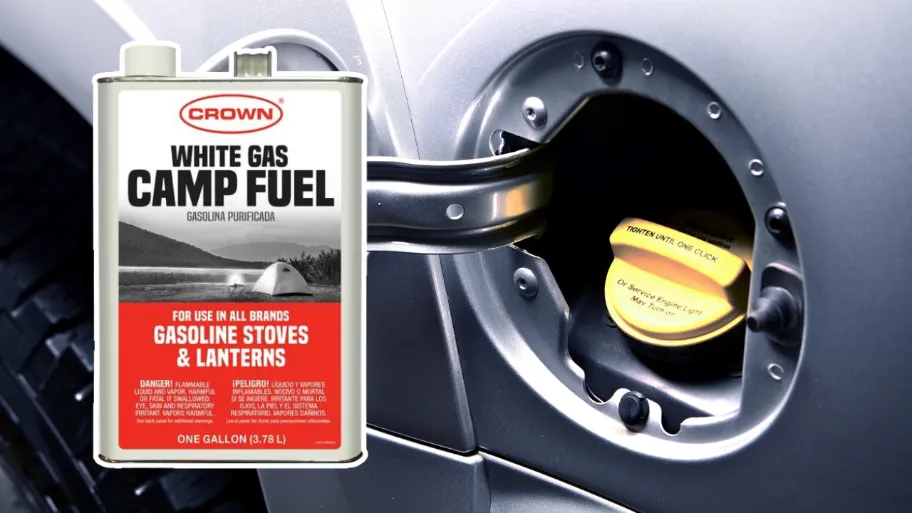
Below are the benefits and drawbacks of using white gas in your car:
Pros
- White gas has a longer shelf life. An unopened bottle of white gas has a shelf life of between 5 and 7 years (but I know of folks who’ve used unopened 20-year-old white gas without issues) and around 6 months when opened.
Gasoline only lasts between 3 and 6 months, after which it starts degrading and forming a gum-like residue which can clog and even damage your engine parts.
It’s therefore impractical to store a container of gasoline in your car for emergencies.
- It’s the best alternative to gasoline in an emergency. Since white gas is the purified form of gasoline (without additives or ethanol) it’s your best bet as an alternative fuel.
I would stay away from using diesel in a gas car because, just like using it with Coleman stoves, it would cause many issues.
Cons
- White gas is much more expensive than gasoline. Using white gas or Coleman fuel (which are the same thing) in your car is an expensive exercise.
For example, in June 2023 the average AAA rate per gallon for gasoline was $3.58. However, buying a 1 gallon bottle of white gas from Walmart would set you back around $8.00.
Crown White Gas Camp Fuel is specially blended for outdoor use of portable gasoline camping applications including gas stoves and lanterns. Manufactured with an added rust inhibitor for rust and corrosion protection. Crown White Gas Camp Fuel is carefully checked to maintain the highest level of quality for a cleaner burn and longer life.
At a cost 2-3x what regular gasoline will cost you, you'll be burning through your bank account just as fast as you burn through the fuel.
- The very low octane level may cause engine part damage if used continuously. Gasoline contains various additives (notably octanes), which improve your engine’s fuel efficiency, prevent corrosion and lubricate parts.
White gas’s octane level is between 50 and 55 and too low to benefit or protect your engine’s parts. The lack of additives and volatility means that it won’t combust as efficiently as gasoline, causing your car not to perform optimally.
In contrast, gasoline is specially designed for your gas car’s spark-ignited internal combustion engine.
- White gas isn’t as readily available as gasoline. Wherever you find yourself, there’s probably a gas station you can walk or drive to. However, you can usually only buy white gas from outdoor stores or online.
- White gas is usually sold in small quantities. If white gas is the only gasoline alternative you have, you probably only have one or two 32oz cans or 1 gallon bottles.
If you consider that a small car’s fuel tank holds around 12 gallons of gasoline, a can or two of white gas won’t get you far.
- Your car’s electronic sensors will probably cause error messages to appear. If your car was manufactured in the past 15 years or so, it likely has a sophisticated computer system that will detect problems with the fuel running through the engine.
To get rid of the error messages, you may need to take your car to a mechanic.

